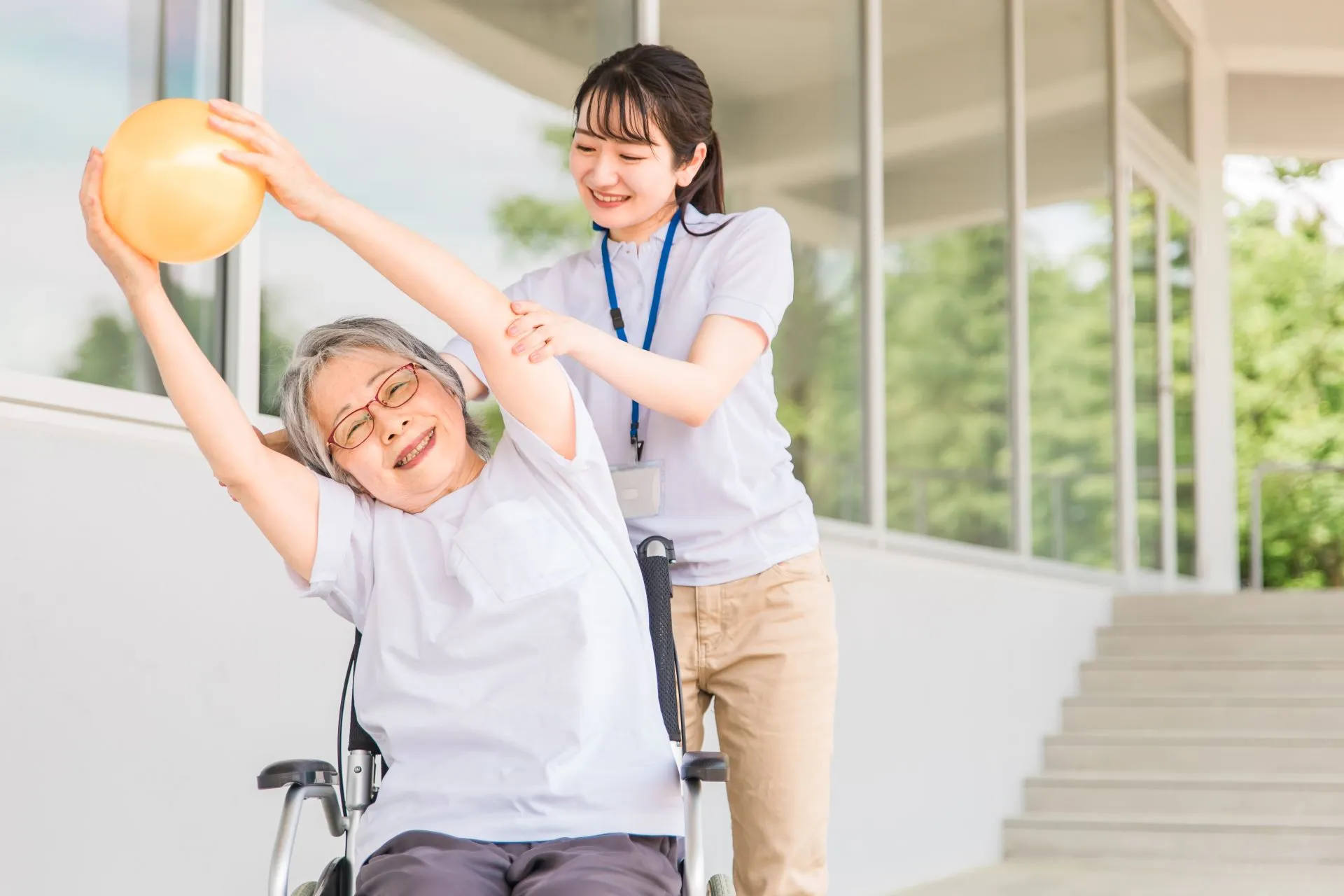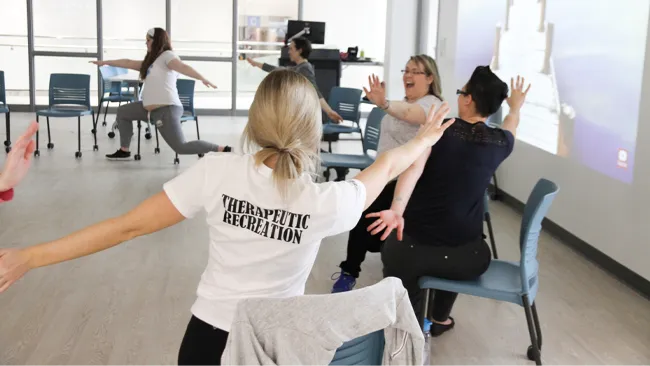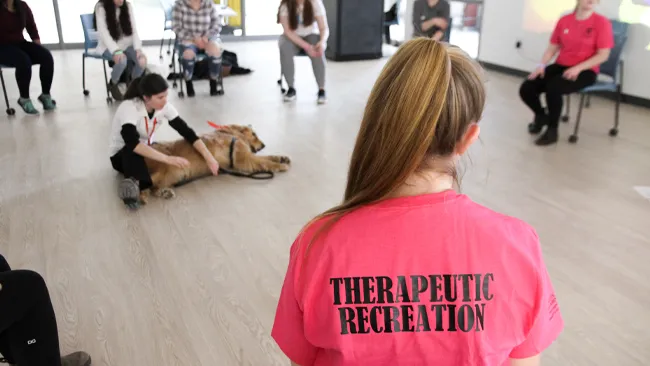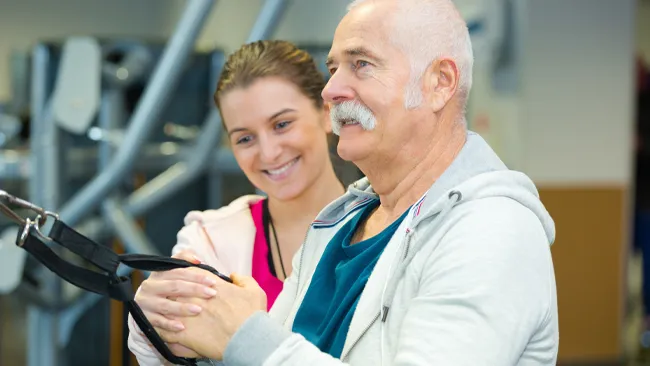
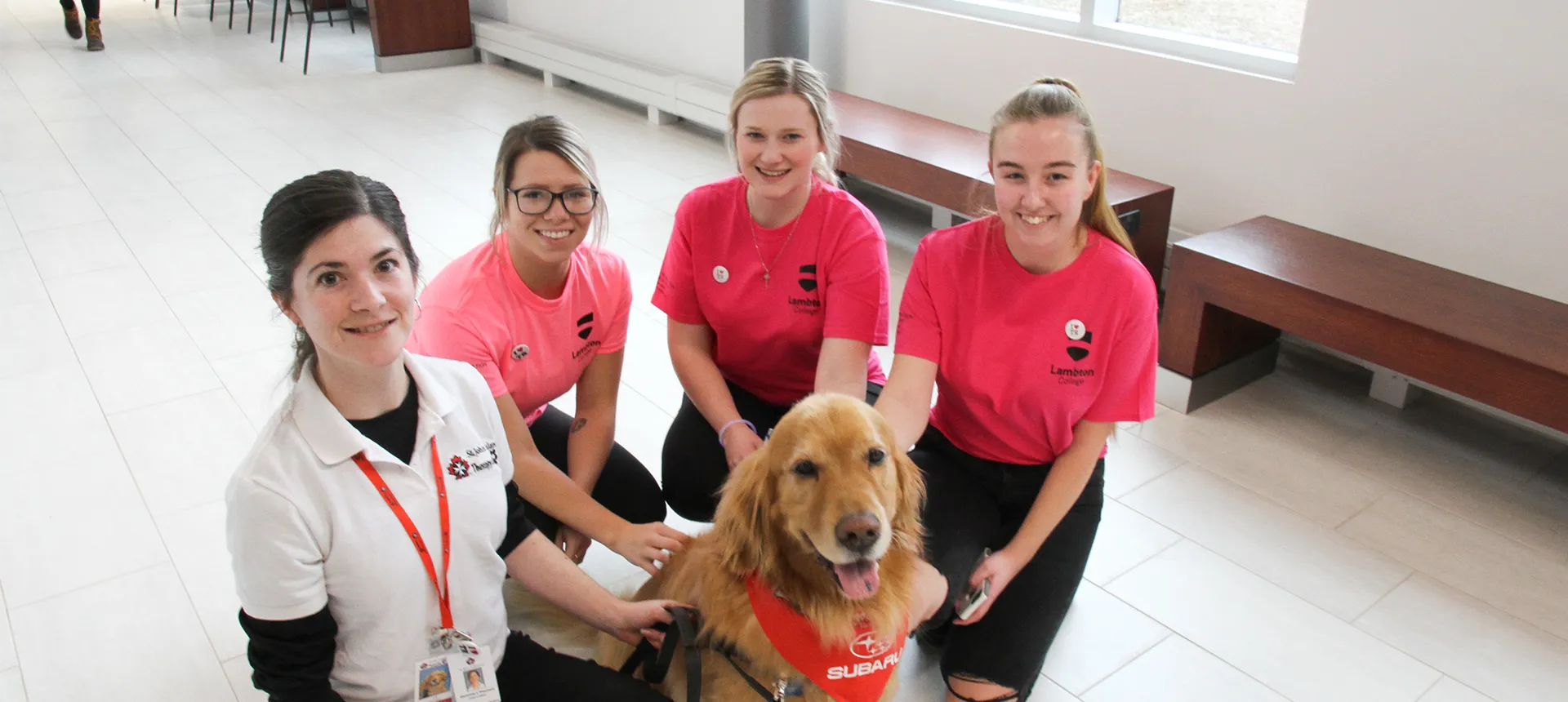
Recreation Therapy
Overview
Be a part of a field dedicated to optimizing health and improving quality of life through recreation and leisure.
Using the therapeutic recreation process, recreation therapists work with persons with physical, cognitive, emotional and/or social limitations to acquire and/or maintain the skills, knowledge and behaviours that will allow them to enjoy their leisure optimally, function independently with the least amount of assistance and participate as fully as possible in society.
The goal is to enable all individuals to achieve quality of life and optimal health through meaningful participation in recreation and leisure. The profession recognizes the importance of the recreation experience and supports all individuals in having full access to and the freedom to choose recreation and leisure opportunities.
Through field placements and community volunteer experiences, students receive valuable hands-on learning. Through these opportunities, students further develop their skills in assessment, planning, implementation, and evaluation. They will also have an opportunity to receive specialized training as part of the course curriculum.
Reasons to Choose Lambton College's Program
Admission Requirements
O.S.S.D. or equivalent with:
- Grade 12 English C or U
Mature Student Assessment for this program is available in the subject of English for the purpose of demonstrating proficiency in this required admission subject. For all other admission requirements, applicants must complete the required course(s) as listed above. For more information, please contact counselling@lambtoncollege.ca. Review the Mature Student Admission process.
Academic admission requirements can be obtained through Academic Upgrading and the Pre-Programs at Lambton College.
Costs
- Year 1 $4,156.71
- Year 2 $4,066.68
Please Note: These fees apply to the 2025-2026 academic year and are subject to change. Fees do not include books (unless specifically noted), supplies or living costs.
Additional Fees
-
Name Tag$15.00
-
Passport to Placement Fee$40.00
-
CPR/First Aid$145.00
Costs Associated with Placement
Students are responsible for all costs associated with travelling to and from placement. A police records check will also be required to be eligible for placement.
Technology Requirements
In order to keep pace with the requirements of each and every course in your program, Lambton College requires that each student have access to a laptop while studying at our college.
Courses
Ethics & Values for the Recreation Therapist
This course is an introduction to the study of philosophy and ethics, and their application to the profession of recreation therapy. Students will evaluate a variety of ethical theories and concepts, as well as the competing ways in which these can be employed to resolve moral issues, in order to develop an ethical foundation for professional practice. Students will learn about ethical theories, including deontology and consequentialism, virtue theory, rights theory and ethical relativism. Finally, the application of such theories to ethical problems specific to professional practice. Issues such as client autonomy, rights and obligations, informed consent, notions of well-being, sexuality, conflict of values, truthfulness and fairness will be examined. Students will have the opportunity to develop decision making, judgment, and personal value positions that form the basis for the examination of professional conduct and personal accountability.
Critical Thinking & Writing
This writing course challenges students to explore diverse opinions and articulate their own perspectives clearly and persuasively. Through critical reading, students will develop skills in synthesis, analysis, comparison, and response, striving for clarity and diplomatic expression of their opinions based on factual evidence. Students will practice various rhetorical strategies of persuasion and hone their writing to ensure precision and accuracy in their messages. This course lays the foundation for a subsequent research-writing course, equipping students with essential skills for academic success.
Anatomy & Physiology
This course is designed to provide pertinent information about the human body and how it functions. The study is concentrated on medical terminology, cells, tissues, organs, and systems and how the systems work together for human survival.
General Education Elective
Foundations of Therapeutic Recreation
This course provides an in-depth study of the scope of therapeutic recreation. Students study the historical and philosophical foundations of the profession. The role of therapeutic recreation professionals in the spectrum of health care and human service settings serving clients with a variety of disabilities is explored. A review of the various definitions used by each of the professional TR organizations, a variety of service models of practice as well as the Therapeutic Recreation process is introduced. Students develop an appreciation of the needs of people with different abilities and the barriers to recreation that they face. There is also a focus on approaches to integration within the community and the issues related to this profession. Students are introduced to ethics in the profession of Therapeutic Recreation.
TR Support Networks and Community Resources
This course will define formal and informal support networks essential to client adjustment and successful social recreation participation. Students will become familiar with community resources and learn how Therapeutic Recreation professionals facilitate education and guided transition to increase access.
Communications for Health
This course, designed for students in the health field, further develops students' communication proficiency. Students create workplace documents and research reports and share their findings through oral presentations. Advocacy and peer education will drive the research and documentation process. Current health issues and research will serve as the impetus for creation of informed research reports and presentations.
Leisure Education and Counselling in Therapeutic Recreation
This course will explore the role of leisure education in assisting individuals and groups in leading a fulfilling leisure lifestyle. This course will also introduce students to counselling tools, techniques and strategies common to leisure education. Students will gain an understanding of the practical and theoretical aspects of lifespan development while studying barriers that impact leisure participation. Students will be given the opportunity to apply this theory by developing leisure awareness activities and interventions for individuals and groups in a variety of settings with a focus on therapeutic recreation.
Therapeutic Recreation Assessment
This course focuses on the role of assessment in the design, delivery and evaluation of therapeutic recreation services for diverse populations. Students will have the opportunity to examine, evaluate and apply a variety of therapeutic recreation assessment tools and techniques. This course provides the student with the knowledge and skills necessary to write therapeutic goals and objectives and to develop individual and group programming based on research. This course will also provide students with the knowledge and skills necessary to demonstrate empathic interpersonal communication skills and to recognize professional and ethical considerations associated with the administration and documentation of assessments.
Adapted Recreation and Program Planning in Therapeutic Recreation
The focus of this course will be on understanding the importance of developing inclusive recreation programs and assisting clients to access activities through adaptive strategies and resources. Students will learn how to conduct activity and task analyses using a systematic approach and will source equipment and opportunities for individuals with a diverse array of interests and needs. Students will have the opportunity to facilitate, participate in, and evaluate a diverse range of adapted activities.
Current Concepts in Health and Wellness
This course provides an in-depth examination of current issues, research, and practices in health and wellness, with a focus on evidence-based approaches to improving personal and public health. Health promotion strategies needed to make healthy, rational, lifestyle choices, to maintain or improve health and how to approach personal change will also be examined. Students will explore key dimensions of wellness-including physical, emotional, social, intellectual, spiritual, and environmental health-and analyze how these areas interact to influence overall well-being. Designed to foster both personal growth and academic insight, this course equips students with the knowledge and practical skills necessary to make informed health decisions and promote wellness in diverse professional and community settings. Students will engage with current public health challenges and emerging wellness trends through critical discussions, self-assessments, and applied learning activities.
Therapeutic Recreation Leadership
This course will provide the student with an in-depth introduction to recreation leadership theory and techniques. Students will examine the diverse leadership roles and responsibilities of therapeutic recreation professionals as group leaders, supervisors and administrators. This course will also emphasize the understanding of group dynamics, motivation, and managing conflict. This highly interactive course will enable students to develop the necessary skills and knowledge to be effective leaders in diverse settings.
Leisure & Aging
Students will develop their knowledge of various issues related to aging including the aging process, theories on aging, ageism, implications of an aging Canadian society, and the role of recreational and leisure activity in the successful aging process. Included in this will be an exploration of various physical and cognitive ailments and disease processes commonly found in the elderly. With this knowledge, students will develop a variety of recreational and leisure programs that focus on physical, cognitive, and psychosocial elements.
Introduction to Community Mental Health
Effective practitioners begin their work with an understanding of how individuals think, feel, and behave. Included in this knowledge must be the contextual factors that impact wellness, including the following: personal challenges, relationships, environmental stressors, and diversity needs. The goal of this course is to provide future front-line workers with practical examples of how a mental health concern might develop and how they might respond. Examination of the biological and sociocultural determinants of addictions and mental illness, treatment options, and community resources that can be leveraged to enhance wellbeing are the key components of this course. Students will not only apply theory and diagnostic criteria to a presenting problem, but they will also become responsive to the grey areas that are unique to a person's situation.
Diverse Abilities in Therapeutic Recreation
This course examines a diverse range of conditions that may result in limitations with varying degrees of severity that have the potential to impact many different areas of life. There will be a focus on the abilities, limitations and characteristics of conditions and their relationship to the five domains of therapeutic recreation and quality of life. Person First and Identity First language will be introduced to promote a positive attitude toward people with disabilities which will foster an individual, not a categorical, approach to understanding and working with people with disabilities. Legislation supporting persons living with diverse abilities will also be discussed.
General Education Elective
General Education Elective
Research in Therapeutic Recreation
This course will introduce the student to the research process with a focus on types of research, data collection, and analysis. Needs and issues surrounding research in the field of therapeutic recreation will be explored and consideration will be given to the reasoning underlying the research process. Students will gain an understanding of the importance of a self-reflective practice and the importance of conducting basic research in their professional careers.
Field placement Seminar
This is the third of three seminars associated with field placement. Students will reflect on placement experiences and begin identifying potential career opportunities in the field of recreation therapy. The seminar integrates the program's academic content with the practical experiences of the student. Information about the student's placement are shared, discussed and analyzed in the classroom in order to integrate academic learning with the realities of recreation therapy practice.
Therapeutic Recreation Practice and Professional Portfolio
This course will provide students with a sound understanding of professional and ethical considerations related to therapeutic recreation practice in the province of Ontario. Students will examine current trends and critical issues in the field of therapeutic recreation including the role of various professional organizations, professional standards and the process of professionalization. Students will acquire the foundational knowledge and skills required to pursue internship opportunities in the field of therapeutic recreation, and will begin the process of developing a professional portfolio of learning and experiences which demonstrates essential abilities of a competent practitioner. Students will examine their role in advancing the profession and identify goals and objectives for their ongoing professional development.
Field Placement I
This is the first of two placement opportunities and is the culminating experience for students in the Recreation Therapy program. It provides the opportunity to integrate academic knowledge and practical skills in a real-world therapeutic recreation setting. Under the supervision of approved professionals and a Faculty Advisor, students will engage in all phases of the therapeutic recreation process, while developing critical thinking, cultural competence, ethical decision-making, and leadership skills. demonstrate competency in assessment, program planning, implementation, evaluation, documentation, and professional communication. Aligned with the Therapeutic Recreation Ontario (TRO) Standards of Practice and Essential Competency Framework, this course enables students to consolidate their academic learning through direct client service, professional collaboration, and reflective practice.
Field Placement II
This field placement provides the student with the opportunity to consolidate all of the academic learning presented during the course of the program and in the first field placement experience. Students will demonstrate competence in all of the Standards of Practice associated with the field of recreation therapy. The student will assist clients throughout all phases of the therapeutic recreation process (assessment, planning, implementation and evaluation) and will coordinate, design and lead therapeutic activities for individuals and groups. Reflective practice assignments, case studies and clinical supervision comprise additional evaluative requirements for this learning experience.
Contact
School of Fire Science, Health & Community Services
Program Information
After Graduation
Employment Opportunities
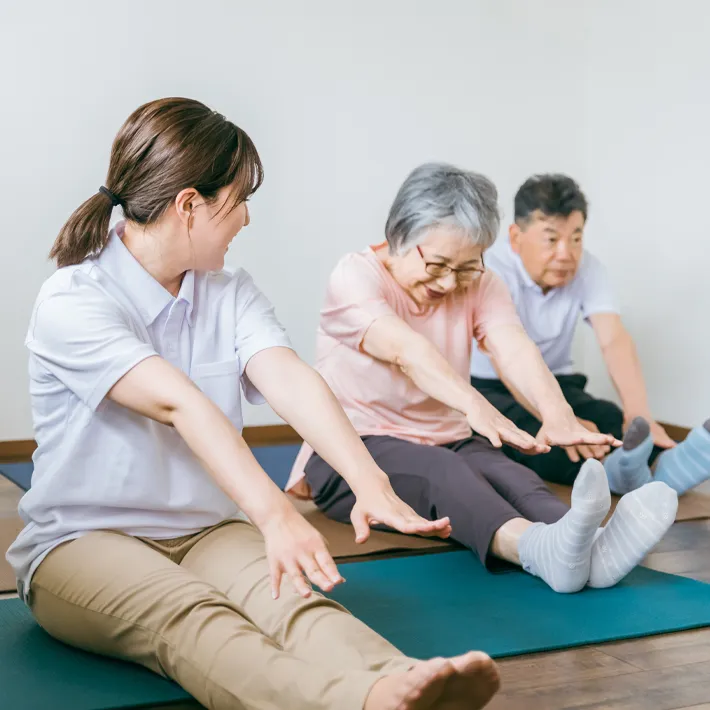
Employment may be found in the areas of pediatrics, mental health, hospitals, community settings, long-term care, rehabilitation, and corrections.
Pathways
Transfer to Programs within Ontario
- Honours Bachelor of Interdisciplinary Studies
- Honours Bachelor of Therapeutic Recreation
- Honours Bachelor of Recreation and Leisure Studies
Want to see more Ontario transfers? Visit ONTransfer.ca.
Accreditations & Certifications
Therapeutic Recreation Ontario
Currently, the registration designation of R/TRO (professionals with a degree) or R/TRO DIP (professionals with a diploma) is a voluntary credential intended to recognize a level of excellence.
It is anticipated that the Government of Ontario will move toward regulation of this profession, but that is not expected for a number of years.
When regulation does occur, the R/TRO DIP designation may represent the minimum criteria necessary. At present, even though it is not provincially mandated, some employers do require R/TRO designation for hiring.
Fees Associated with Therapeutic Recreation Ontario
- Therapeutic Recreation Membership (optional)
- Professional Membership - $180 per year
- Associate Membership - $150 per year
- Therapeutic Recreation Ontario Registration - R/TRO DIP
- Initial Registration Fee - $165
Become a Member
Placement
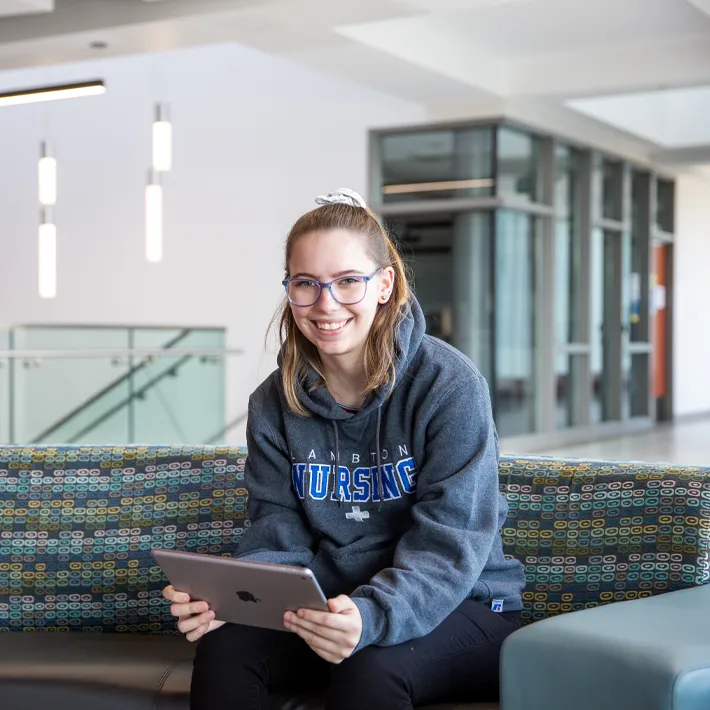
Vaccinations & Police Record Checks
Students considering this program should be aware that there are field placement requirements. All placements require students to have police record checks. Proof of immunizations is also required and must be cleared through Passport to Placement.
Once you’ve applied, you can log in to mylambton.ca and view the program-specific Field & Clinical Placement Requirements. If you need information about these requirements before applying, please contact placementinfo@lambtoncollege.ca.
More Information
Registration Designation
According to Therapeutic Recreation Ontario, the registration designation (R/TRO) is currently a voluntary credential intended to recognize a level of excellence. It is anticipated that the Government of Ontario will move toward regulation of the profession, but this is not expected to happen for a number of years.
When regulation does occur, the R/TRO designation may represent the minimum criteria necessary. Currently, even though it is not provincially mandated, some employers do require R/TRO designation for hiring.
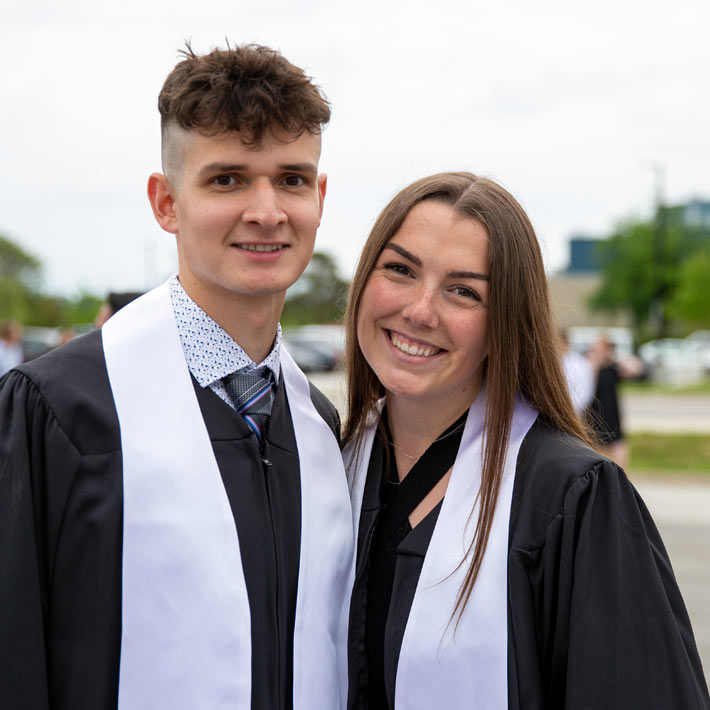
Technology Requirements
It is recommended that students purchase a laptop with a Windows operating system.
Internet Speed Requirements
For best performance for students learning remotely, an internet connection with a minimum of 40 Mbps download and 10 Mbps upload speed is recommended in order to effectively use video conferencing and remote lecture delivery software as well as, other online resources remotely. Due to the large area over which students may be dispersed, we are unable to recommend a specific provider, so you will need to inquire around your area to find one that best suits your needs.
Minimum Laptop Requirements
In order to access the internet and virtually-delivered software and courseware, student laptops should include the following at a minimum. By meeting the following specifications, students will be equipped to access software and courseware on their laptop through the internet:
- Intel i5 8th Gen Processor or equivalent
- 16 GB of RAM (with a minimum of 8 GB)
- 100 GB HDD or more
- HD Graphics
- Webcam with a microphone
- Wireless 802.11n/ac 5ghz capable
- Windows Operating System (Windows 11)
Please note that Chromebooks and MacBooks may not support all software required for your program; students should verify compatibility with their professors.
Software
To ensure students are getting the most our of their classroom experience, some software will be required.
Lambton College has made this software easily accessible online. Students can leverage our Microsoft Office 365 software packages and services. In addition, much of the software you require for your courses will be available on demand for use on any device - on or off campus.
